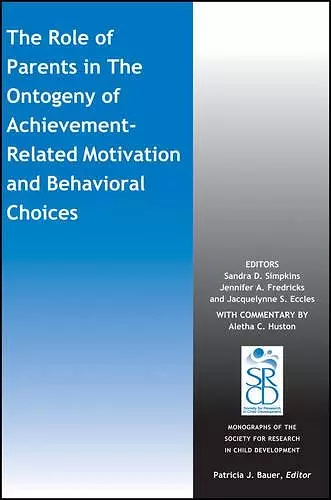The Role of Parents in the Ontogeny of Achievement-Related Motivation and Behavioral Choices
Jacquelynne S Eccles editor Patricia J Bauer editor Jennifer A Fredricks editor Sandra D Simpkins editor
Format:Paperback
Publisher:John Wiley and Sons Ltd
Published:18th May '15
Currently unavailable, and unfortunately no date known when it will be back

Parents believe what they do matters. But, how does it matter? How do parents’ beliefs about their children early on translate into the choices those children make as adolescents? The Eccles' expectancy-value model asserts that parents' beliefs about their children during childhood predict adolescents' achievement-related choices through a sequence of processes that operate in a cumulative, cascading fashion over time. Specifi cally, parents' beliefs predict parents' behaviors that predict their children's motivational beliefs. Those beliefs predict children's subsequent choices. Using data from the Childhood and Beyond Study (92% European American; N 723), we tested these predictions in the activity domains of sports, instrumental music, mathematics, and reading across a 12-year period. In testing these predictions, we looked closely at the idea of reciprocal infl uences and at the role of child gender as a moderator. The cross-lagged models generally supported the bidirectional influences described in Eccles' expectancy-value model. Furthermore, the findings demonstrated that: (a) these relations were stronger in the leisure domains than in the academic domains, (b) these relations did not consistently vary based on youth gender, (c) parents were stronger predictors of their children's beliefs than vice versa, and (d) adolescents' beliefs were stronger predictors of their behaviors than the reverse. The findings presented in this monograph extend our understanding of the complexity of families, developmental processes that unfold over time, and the extent to which these processes are universal across domains and child gender.
ISBN: 9781119135210
Dimensions: 229mm x 152mm x 10mm
Weight: 245g
316 pages
2nd edition